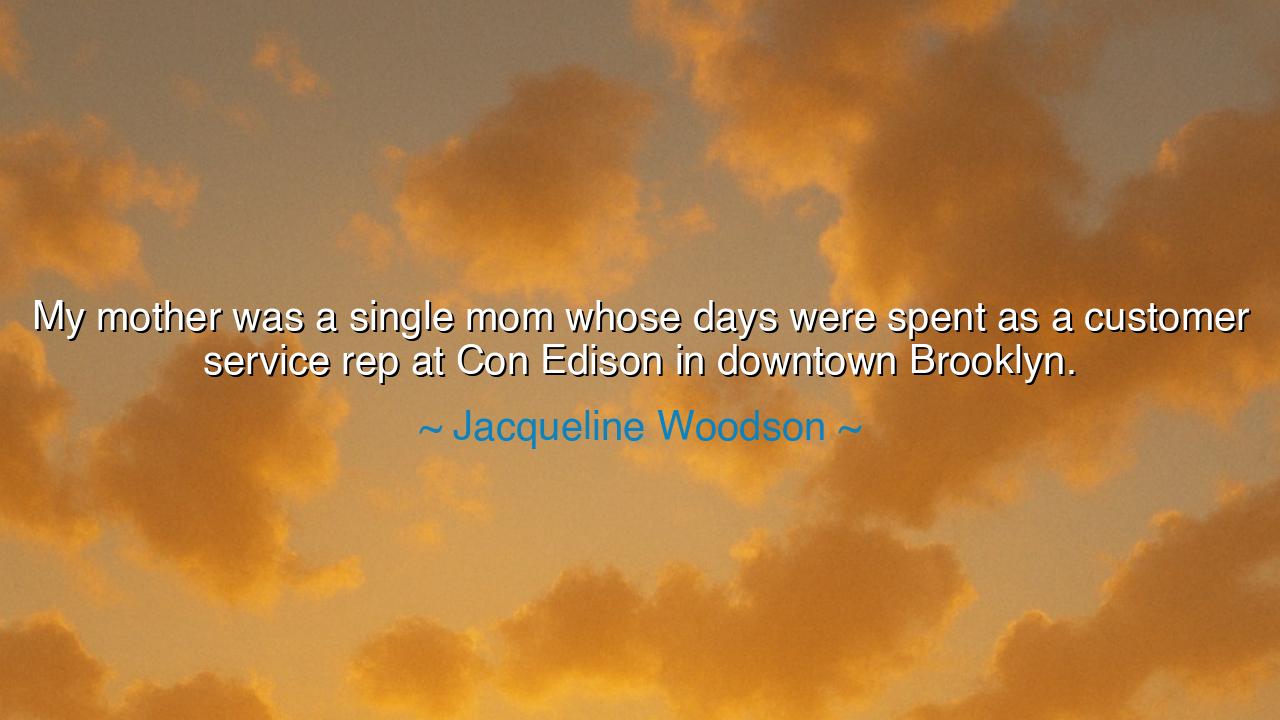
My mother was a single mom whose days were spent as a customer
My mother was a single mom whose days were spent as a customer service rep at Con Edison in downtown Brooklyn.






Jacqueline Woodson, a poet of memory and truth, once spoke with reverence: “My mother was a single mom whose days were spent as a customer service rep at Con Edison in downtown Brooklyn.” These words, though plain in form, ring with the weight of endurance and love. They tell the story of a woman whose labor, though unseen by the world’s applause, built the foundation upon which greatness could grow. For every tale of triumph carries behind it the hidden sacrifices of those who bore burdens silently.
The ancients knew the power of such stories. They told of Penelope, who though overshadowed by the glories of Odysseus, held the household together in his absence, weaving and unweaving by candlelight so that her family might endure. In like manner, Woodson’s mother becomes a figure of quiet heroism. She did not wield sword or pen, but headset and telephone, her voice carrying patience into the weary calls of strangers. Yet it was through such toil that her daughter’s dreams were nourished, her future safeguarded.
There is deep sorrow and strength in the phrase “single mom.” For it speaks of struggle borne alone, of two hands doing the work of four, of loneliness faced with courage. Yet it also speaks of love so strong it does not falter, even when stretched to its limits. To work at Con Edison in the bustle of Brooklyn was not glory, but survival—and in survival, dignity. The ancients would say: she carried the weight of Atlas, and though her back bent beneath it, she did not break.
Consider, too, the countless mothers in history who, though nameless, shaped destinies. Sojourner Truth, before she became a voice for freedom, was first a mother who fought to reclaim her child from slavery’s grasp. Abraham Lincoln’s mother, Nancy Hanks, was a poor frontier woman whose labor and faith gave the world a president. In every age, the greatness of nations is built upon the quiet heroism of mothers whose sacrifices the world overlooks, yet whose children rise to carry forward their spirit.
Woodson’s words also reveal gratitude. She does not distance herself from her mother’s humble labor, but honors it. In this, she teaches us that greatness is not found only in the lofty halls of power, but in the ordinary struggles of those who keep families alive, who go to work day after day so that their children may dream. To remember such labor is to resist the blindness of pride, to acknowledge that one’s success is never one’s own, but the fruit of roots watered by others.
The lesson here is powerful: honor those who came before you, especially those whose work was humble, unseen, and uncelebrated. Do not despise small jobs, for within them lies the sustenance of life itself. Every paycheck earned in weariness, every meal placed on the table, every hour of patient service—these are acts of love, heroic in their simplicity. The world may not build monuments to such deeds, but children who remember them become living monuments themselves.
Therefore, let us carry Woodson’s wisdom into our own lives. Let us not only pursue our own dreams, but also remember the shoulders upon which we stand. Let us honor the mothers, the fathers, the caregivers, the workers whose daily grind made our paths possible. And let us live so that when others speak of us, they too will say: this life was built on sacrifice, on devotion, on love unbroken by hardship.
For in the end, the true greatness of Woodson’s mother is not that she worked at Con Edison, but that she did so faithfully, with love, so her child might rise. This is the eternal teaching: that greatness often begins in the ordinary, and that the ordinary, when fueled by love, is itself more than enough to change the world.






AAdministratorAdministrator
Welcome, honored guests. Please leave a comment, we will respond soon